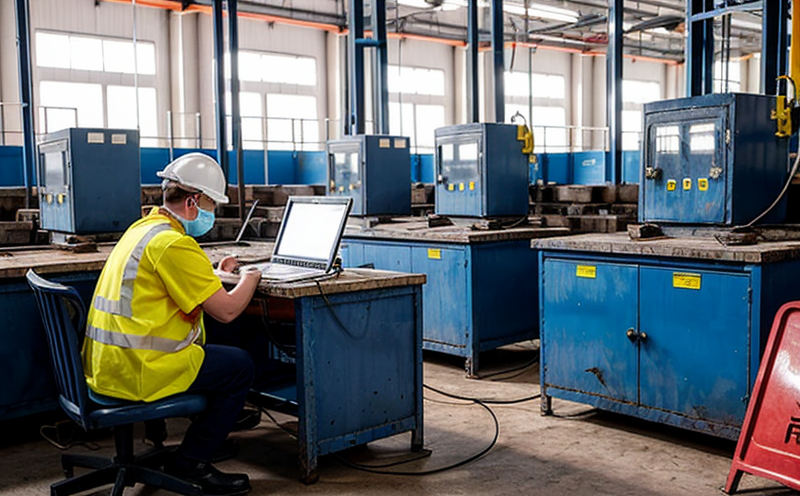ISO 20345 Safety Footwear Testing for Factories
In industrial manufacturing and processing environments, occupational health and safety (OHS) plays a pivotal role in ensuring the well-being of factory workers. One crucial aspect of this is providing footwear that not only fits comfortably but also meets stringent safety standards to protect against potential hazards on the job site. The ISO 20345 standard sets forth comprehensive guidelines for testing industrial safety footwear, addressing factors such as impact resistance, compression resistance, electrical insulation, and more.
The primary focus of this service is to ensure that the safety footwear provided meets or exceeds the requirements set by ISO 20345. This involves a series of tests designed to simulate real-world conditions faced by workers in industrial settings. The standard covers various types of footwear used across different industries, ensuring they are suitable for protecting against specific hazards encountered in factories.
Testing begins with the receipt and inspection of safety footwear samples. These samples are then subjected to rigorous testing procedures that evaluate their performance under controlled conditions. For instance, impact resistance tests assess whether the footwear can withstand a specified force without compromising its structural integrity. Similarly, compression tests determine if the sole of the shoe retains its shape after being compressed by a certain weight.
Electrical insulation testing is another critical aspect, ensuring that workers are protected from electrical hazards present in many industrial environments. This test checks whether there is any leakage current between the outer surface of the footwear and the inner lining or sole, which could pose an electrocution risk. Additionally, slip resistance tests evaluate how well the footwear adheres to various surfaces under different conditions, including wet and dry scenarios.
The testing process also includes assessing the durability and comfort of the footwear. Durability ensures that the safety features remain intact even after prolonged use in harsh environments. Comfort is equally important as it directly affects worker productivity and satisfaction with their protective gear. By adhering to ISO 20345 standards, we ensure that factory workers receive footwear that not only protects them but also enhances their overall working experience.
In summary, our service for ISO 20345 safety footwear testing in factories is designed to provide a thorough evaluation of industrial safety footwear based on internationally recognized standards. This ensures that the footwear meets all necessary criteria for protection and comfort, thereby contributing significantly to workplace safety and productivity.
Applied Standards
| Standard | Description |
|---|---|
| ISO 20345:2018 | This standard specifies the requirements for safety footwear used in industrial and occupational environments. It covers various types of protective footwear, including steel-toed boots, metatarsal guards, puncture-resistant shoes, and more. |
| ISO 20345:2018 Amd 1 | This amendment provides additional guidance on the test methods for electrical insulation performance of safety footwear. It ensures that workers are protected against electrical hazards in industrial settings. |
Benefits
The ISO 20345 safety footwear testing service offers numerous benefits to factory owners and managers. By ensuring that the safety footwear meets international standards, businesses can significantly reduce the risk of workplace accidents and injuries. This not only enhances worker safety but also contributes to improved productivity and morale within the organization.
Compliance with ISO 20345 helps companies avoid legal issues related to non-compliant products. Many countries have regulations requiring employers to provide workers with suitable protective gear, and failing to meet these standards can result in fines or other penalties. By partnering with us for ISO 20345 safety footwear testing, businesses ensure they are meeting all necessary regulatory requirements.
The service also aids in enhancing the reputation of factories as safe workplaces. Employees are more likely to feel valued and supported when their employers invest in their safety. This can lead to higher job satisfaction and lower turnover rates, ultimately benefiting the company's bottom line.
Moreover, ISO 20345 compliant footwear is designed with comfort in mind. Workers who are comfortable while working are more productive and less likely to develop musculoskeletal disorders due to prolonged periods of standing or walking. This results in reduced absenteeism and increased efficiency on the factory floor.
Lastly, our service provides peace of mind for both employers and employees. Knowing that the safety footwear has undergone rigorous testing according to ISO 20345 ensures that workers are protected against potential hazards, leading to a safer working environment overall.
Competitive Advantage and Market Impact
In an increasingly competitive industrial market, maintaining high standards of occupational health and safety is essential. By offering ISO 20345 safety footwear testing services, companies can differentiate themselves from competitors who may not prioritize worker protection as thoroughly.
Meeting the stringent requirements set by this international standard demonstrates a company's commitment to employee well-being, which can be a key factor in attracting and retaining top talent. Employees are more likely to choose employers that invest in their safety and comfort, giving factories an edge over those who do not.
The service also enhances the overall reputation of the factory as a safe and reliable employer. This positive image can translate into better relationships with customers and suppliers, fostering long-term business partnerships. Furthermore, compliance with ISO 20345 can open up new markets or opportunities for expansion, particularly in regions where strict safety regulations are enforced.
From a strategic perspective, investing in worker protection aligns with broader corporate social responsibility (CSR) initiatives. This approach not only benefits the company but also contributes positively to society at large. By prioritizing safety and health, factories can play a role in promoting a safer working environment for all workers across industries.





